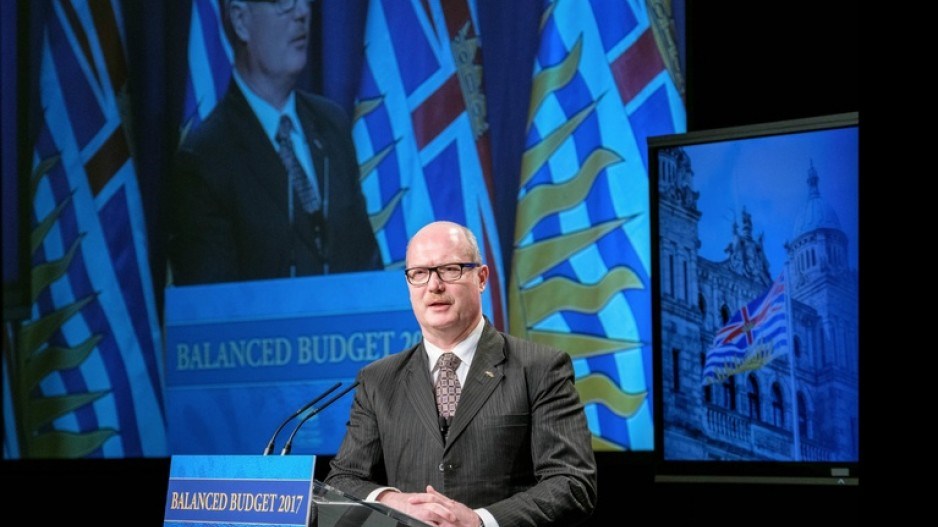Unless it has plans for massive tax increases, an NDP government would have to run a $602 million deficit in its very first budget, and total deficits of $8 billion over four years, according to B.C. Finance minister Mike de Jong.
The NDP’s platform, released last week, projects balanced budgets over three years. But only some of the spending pledges are costed.
At a press conference Wednesday, April 19, de Jong said an analysis by a Liberal team of the NDP platform identified 14 major NDP policies that are not costed.
He warned that the NDP cannot pay for all of its campaign promises without massive tax raises or running up the debt, which would in turn affect the province’s Triple A credit rating and increase government borrowing costs.
“That these promises that are coming fast and furious from Mr. Horgan and the NDP can be accommodated within a balanced budget, absent massive tax increases, is simply absurd,” de Jong said. “There are a lot of promises that have been made that aren’t costed at all.”
The Liberals estimate the NDP’s operating deficit would be $6.4 billion over four years and its capital spending deficit would be $17 billion.
In a news release, the NDP responded by saying the Liberals are making some of their calculations based on promises the NDP has not made.
One of the items that de Jong said is not accounted for is the NDP’s plans to phase out Medical Services Plan premiums.
According to the Liberals’ calculation, scrapping the MSP would cost the government $1.7 billion. Replacing it with some other form of taxation would either require a 2% hike to the PST, a 20% hike to personal income taxes or a 52% hike to corporate income taxes, de Jong said.
But as Province columnist Mike Smyth pointed out, the Liberals have also promised to eventually phase out MSP premiums without saying how they will replace the lost revenue either.
Asked to explain how the Liberals and NDP can do the same thing -- eliminate the MSP -- but only the NDP needs to raise taxes to do it, de Jong said that his party's pledge to phase out the MSP was "an objective" that it will only do when it can afford to.
"Christy Clark has promised to eliminate the MSP but they haven't said how they'd pay for it," the NDP Party said in a news release. "Even worse, Mike de Jong made clear today that the BC Liberals have no intention of actually getting rid of the MSP, saying they are not making an 'unequivocal promise.'"
Whereas the Liberal government has budgets that call for surpluses of more than $200 million each year between 2017 and 2021, de Jong said that, if the NDP lives up to its commitments, it would have a deficit of $602 million in the first budget, which would have to rise to $4 billion by 2020-2021. That, or it would have to raise taxes.
The Liberals have planned to cap tolls on the Port Mann and Golden Ears bridges at $500 annually, while the NDP has promised to scrap them entirely.
The NDP plans to use the Liberal government’s $500 million Prosperity Fund to cover the first few years of revenue loss. But de Jong said there is still a $761 million funding gap over a four-year period.
The NDP have pledged to build 114,000 affordable and rental housing units over 10 years to address housing affordability. Assuming BC Housing contributes 50%, at $250,000 per unit, the Liberals estimate the cost to the provincial government in government debt would be $4.7 billion just in the first four years.
According to the Liberals’ analysis, other funding gaps on major NDP planks include (over four years):
• freezing BC Hydro rates, $1.2 billion;
• freezing ICBC rates, $1.2 billion;
• reducing ferry fares, $64 million; and
• interest free student loans and $1,000 completion grants, $157 million.
But the NDP has said it would only freeze BC Hydro for two years, not four. Nor has it promised to freeze ICBC rates. What it has said it would do is halt the 42% rate hike that is planned over a five-year period.
Measures like removing tolls would mean taking debt off of a government business entity, which holds debt outside of government, and putting it back onto government’s accounts. That would increase the government debt, and affect its credit rating, which would increase borrowing costs, de Jong warned.
Since 2005, the government has whittled its operating debt down from $14 billion to $10 billion in 2014, with plans to have it at $1.1 billion by 2021.
De Jong said the NDP's capital spending plans would increase that debt by $4.2 billion by 2021.



